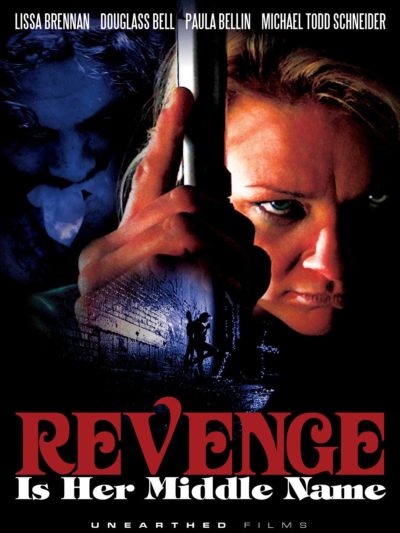★★½
“Hyde and sick”
 This gets off to an impressive and intriguing start. Cora Fisher (Pribilski) has a perfectly normal life. Then, she’s involved in a car crash. The next thing she knows, she wakes up in a hospital bed. Oh, to which she is handcuffed. Before she can come to terms with that, she is informed that ten years have passed. And completing the triple-whammy, Texas Ranger Jim Krueger (Llorens) enters, and tells Cora he’s going to make sure she gets the death penalty for the murders she committed. It’s safe to say, the movie has successfully gained my attention by this point. Guided by mysterious cellphone texts, Cora escapes the hotel and goes on the run, seeking to find out the truth about what happened.
This gets off to an impressive and intriguing start. Cora Fisher (Pribilski) has a perfectly normal life. Then, she’s involved in a car crash. The next thing she knows, she wakes up in a hospital bed. Oh, to which she is handcuffed. Before she can come to terms with that, she is informed that ten years have passed. And completing the triple-whammy, Texas Ranger Jim Krueger (Llorens) enters, and tells Cora he’s going to make sure she gets the death penalty for the murders she committed. It’s safe to say, the movie has successfully gained my attention by this point. Guided by mysterious cellphone texts, Cora escapes the hotel and goes on the run, seeking to find out the truth about what happened.
It would be almost impossible for any film to live up to what is a cracking opening 20 minutes. You’ll perhaps have guessed from the star rating above, this certainly doesn’t. Part of the problem is the decision to leave Cora, when simply experiencing proceedings from her perspective would perhaps have been best, the audience discovering her past alongside her. Instead, it diverts into considerably less interesting areas, such as following Krueger. You’ll be forgiven if you’re making gestures towards your television set, trying to guide the plot back towards the heroine. The other problem is, when it does eventually get back there and resolution is obtained, the answer is considerably less interesting than the question. For spoiler reasons, I won’t go into detail, but it fell short of convincing to me.
I think the script ends up being pulled in too many different directions, and us not being able to do justice to many of them. For instance, there’s an odd Purge vibe, with people in masks, going round killing people with apparent immunity. It’s an angle that doesn’t seem to fit the psychological slant to much of the proceedings, and nor does it particularly appear to add extra value. The film is technically solid, and Pribilski does well enough in a role that must have been a dramatically challenging experience. The rest of the cast are largely functional. It does feel they are more like plot devices made flesh, there to move the story along.
But in the end, it is that story which represents the movie’s biggest problem. I’m always dubious about amnesia as a device. It often feels a lazy way for film-makers to generate mystery, which can then be equally easily solved by the protagonist miraculously remembering things again, as and when needed by the plot. This is a good example of that: without the convenient medical condition, the movie would have been over in about ten minutes. If you’re going to use it, the payoff has to be adequate for the disbelief you ask the audience to suspend. That definitely isn’t the case here and, despite some positives, this founders as a result, and struggles to make it over the finish line.
Dir: Dallas Burgess
Star: Kelsey Pribilski, Chip Llorens, Avi Lake, Diana Rose





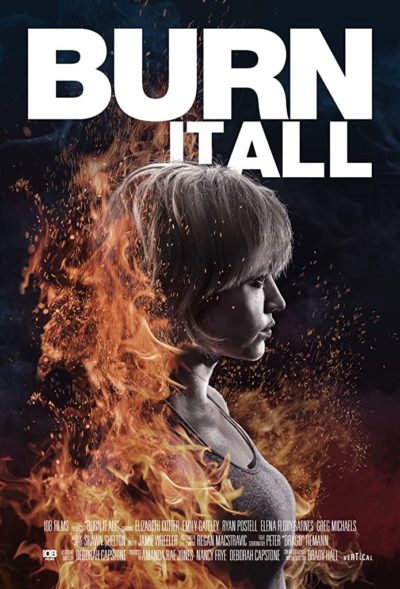 I will say, I did actually enjoy this rather more than the rating above indicates. For pure entertainment value, it’s a 3 to 3½-star entity, when watched as a brutal parody of new feminism. The problem is, I don’t think those involved with it were making a parody. As a serious statement about gender, it’s almost impossible to take seriously. Alexandra Nelson (Cotter) is at the end of her tether, when she gets a call that her long-estranged mother is dying. Driving home to pick up the body, she finds it being hustled out the back of the crematorium. Turns out to be part of an organ harvesting scheme, run by the local crime bosses. This gives Alex something to live for, and she begins a one-woman campaign to take down the perpetrators. But that’s a mission which will drag in her estranged sister, bikini barista Jenny (Gately), into peril as Alex’s targets respond to her actions.
I will say, I did actually enjoy this rather more than the rating above indicates. For pure entertainment value, it’s a 3 to 3½-star entity, when watched as a brutal parody of new feminism. The problem is, I don’t think those involved with it were making a parody. As a serious statement about gender, it’s almost impossible to take seriously. Alexandra Nelson (Cotter) is at the end of her tether, when she gets a call that her long-estranged mother is dying. Driving home to pick up the body, she finds it being hustled out the back of the crematorium. Turns out to be part of an organ harvesting scheme, run by the local crime bosses. This gives Alex something to live for, and she begins a one-woman campaign to take down the perpetrators. But that’s a mission which will drag in her estranged sister, bikini barista Jenny (Gately), into peril as Alex’s targets respond to her actions.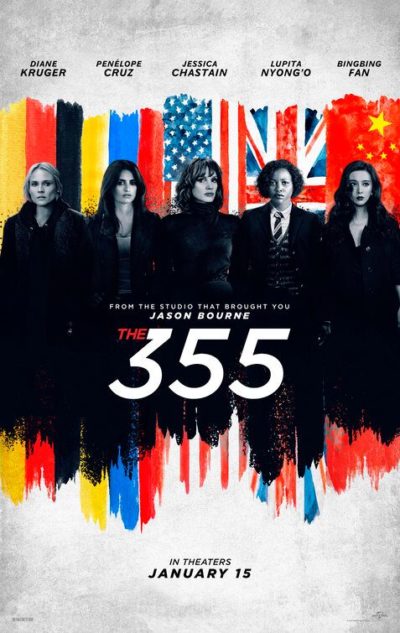 I went into this preparing to hate it. There had been red flags all over the place, such as star and producer Chastain coming out with comments about her movie like, “It’s very important for society. We’ve moved against the status quo, and we’re creating our own narrative for it. The film is, in some sense, a political act.” Uh-oh. No film is
I went into this preparing to hate it. There had been red flags all over the place, such as star and producer Chastain coming out with comments about her movie like, “It’s very important for society. We’ve moved against the status quo, and we’re creating our own narrative for it. The film is, in some sense, a political act.” Uh-oh. No film is  There’s a decent idea here, and an attempt to add some new wrinkles to that old reliable, the rape-revenge genre. Unfortunately, there are too many problems and missteps to make this a worthwhile entry. Violet (Winkler) is an aspiring actress, whose dreams are shattered when she falls for a fake audition. She is lured into a basement, raped, and the resulting footage posted on a highly-dubious website. She’s clearly broken by the trauma, to the increasing worry of her mother (Burns). But hope is present in her growing relationship with Josh (Crowe), a young man she met at the lake where Violet likes to sit, trying to find some measure of peace. However, how will he react when he finds out about her other life, in which she is making those responsible for the assault, pay.
There’s a decent idea here, and an attempt to add some new wrinkles to that old reliable, the rape-revenge genre. Unfortunately, there are too many problems and missteps to make this a worthwhile entry. Violet (Winkler) is an aspiring actress, whose dreams are shattered when she falls for a fake audition. She is lured into a basement, raped, and the resulting footage posted on a highly-dubious website. She’s clearly broken by the trauma, to the increasing worry of her mother (Burns). But hope is present in her growing relationship with Josh (Crowe), a young man she met at the lake where Violet likes to sit, trying to find some measure of peace. However, how will he react when he finds out about her other life, in which she is making those responsible for the assault, pay.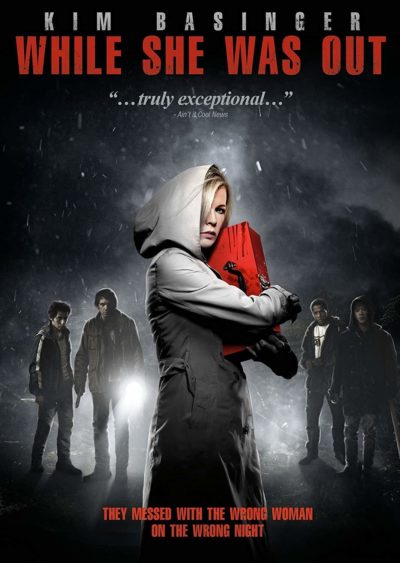
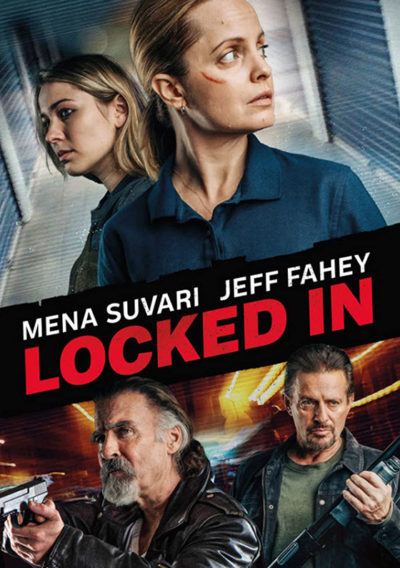 I am old enough to remember when Suvari was playing jailbait in American Beauty. It is therefore a bit disturbing to find her here, taking on the role of the mother of a seventeen-year-old daughter. Where has the time gone? But then, it has now been approaching 23 years since Beauty came out. This realization is probably more chilling than anything this technically competent, but almost entirely lacklustre thriller is able to deliver. It starts off with an interesting premise, and even has some not commonly-seen elements in its heroine. But the longer this goes on, the more it feels rote and by the numbers, without enough to differentiate it from other, better entries in the (more or less) Die Hard knock-off sub-genre.
I am old enough to remember when Suvari was playing jailbait in American Beauty. It is therefore a bit disturbing to find her here, taking on the role of the mother of a seventeen-year-old daughter. Where has the time gone? But then, it has now been approaching 23 years since Beauty came out. This realization is probably more chilling than anything this technically competent, but almost entirely lacklustre thriller is able to deliver. It starts off with an interesting premise, and even has some not commonly-seen elements in its heroine. But the longer this goes on, the more it feels rote and by the numbers, without enough to differentiate it from other, better entries in the (more or less) Die Hard knock-off sub-genre. Firstly, I’m not quite sure whether this is a movie or not. The IMDb lists it with a running time of 98 minutes, but Tubi had it as 4 x 25-minute episodes. I’m guessing the former is just a compilation of the latter, it works about the same either way. The title translates as “The way of the empty hand”, and the emphasis here is very much on the first part: the journey. The heroine is Nicki Wright (G. Niebauer), who has barely got out of rehab for alcohol problems, when she gets involved in a brawl, after seeing a woman being assaulted by a man. Her mother had had enough of dealing with Nicki’s taciturn BS, and dumps her on her father, Cliff (D. Niebauer).
Firstly, I’m not quite sure whether this is a movie or not. The IMDb lists it with a running time of 98 minutes, but Tubi had it as 4 x 25-minute episodes. I’m guessing the former is just a compilation of the latter, it works about the same either way. The title translates as “The way of the empty hand”, and the emphasis here is very much on the first part: the journey. The heroine is Nicki Wright (G. Niebauer), who has barely got out of rehab for alcohol problems, when she gets involved in a brawl, after seeing a woman being assaulted by a man. Her mother had had enough of dealing with Nicki’s taciturn BS, and dumps her on her father, Cliff (D. Niebauer).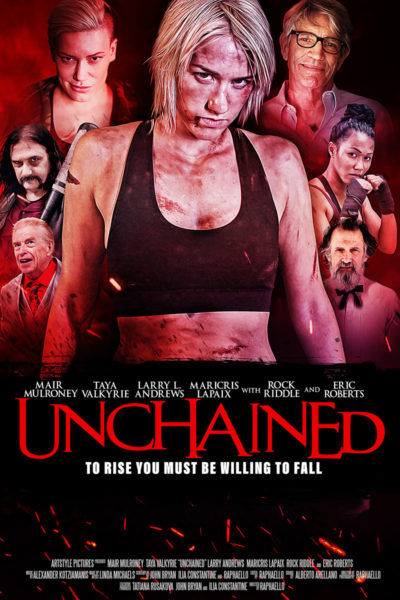 This likely suffered, having been watched the day after Boyka: Unleashed which, while not an action heroine film by any stretch of the imagination, is a near-perfect demonstration of how brutal, no-holds barred fights
This likely suffered, having been watched the day after Boyka: Unleashed which, while not an action heroine film by any stretch of the imagination, is a near-perfect demonstration of how brutal, no-holds barred fights 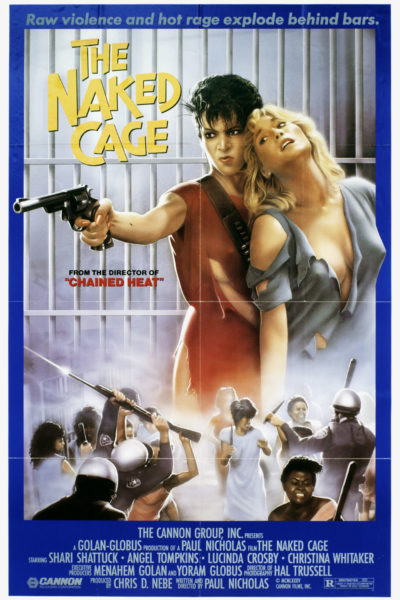
 Yes, in some way, this is probably among the closest the West has come to reproducing the DGAF attitude of Japanese entries like the
Yes, in some way, this is probably among the closest the West has come to reproducing the DGAF attitude of Japanese entries like the 